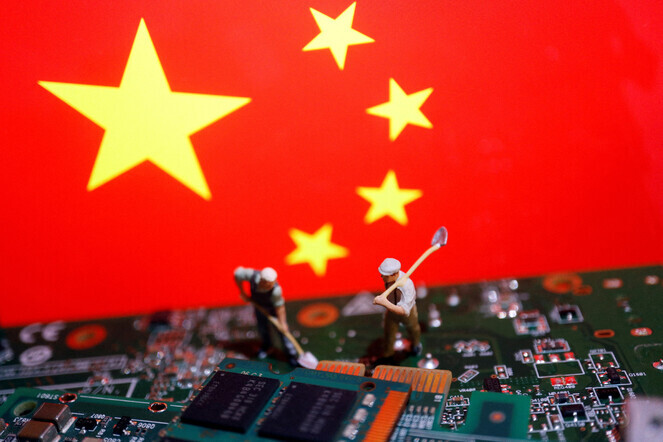hankyoreh
Links to other country sites 다른 나라 사이트 링크
China calls rare earth export curbs a “warning” to US and allies

Policies controlling gallium and germanium exports announced by China’s Ministry of Commerce on Monday sent the message that Beijing will not sacrifice its environment to supply rare earth metals in the future and will not be exploited by the US any longer, a state-run news outlet said.
The explanation is drawing attention for providing insights into China’s mindset as it engages in a tense strategic rivalry with the US in advanced industry areas such as semiconductors.
In an editorial published Tuesday evening under the title “US, its allies need to listen to China’s warning on key materials exports,” China’s Global Times said, “Even though China is the world's major supplier of gallium and germanium products, which are essential for the making of semiconductors and other electronic components, it should be noted that the US also has large reserves of gallium and germanium resources.”
The editorial also cited statistics from the US Geological Survey stating that the US accounts for 3,870 tons (45%) of the 8,600 tons in global germanium deposits, while China accounts for another 3,500 tons.
The US has been stockpiling germanium since designating it as a strategic resource in 1984. Recently, it has banned its extraction.
During the 1990s, China began taking over the global market in the extraction, refining, and supply of rare earth elements, after other advanced economies began pulling out due to environmental issues and other factors. According to data provided last year by the International Energy Agency, China accounted for 60% of global rare earth extraction and 87% of processing.
“For years, China has been exploiting its limited rare-earth resources to supply key rare metals at the expense of the environment to support the development of global strategic emerging industries such as semiconductors,” the editorial said.
“Yet, the US-led chip war has seen China being cut off chip supplies and other relevant equipment, materials and technologies, which is clearly hurting China's interests in terms of the industrial chain, rare-earth resources, and environmental protection,” it continued.
Observing that the US was in “violation of the normal order of international trade, which has seriously sabotaged global production chain,” the editorial asked, “Why can't China make the necessary adjustments?”
The argument presented in the piece was that although China has shouldered environmental burdens in its efforts to provide stable rare earth supplies as part of the global semiconductor supply chain to date, the US’ efforts to exclude it have left it no option but to act in accordance with its own “national security and interests” going forward.
In a separate article, the Global Times further observed that gallium is a “widely used in advanced radar systems installed on warplanes, warships and ground installations,” predicting that the measure “could hit the US defense industry.”
China’s first use of rare earth elements as diplomatic leverage came in 2010 amid its territorial dispute with Japan over the Senkaku (Diaoyu) Islands. That time, it acted quietly without announcing the fact that it had limited rare earth exports to Japan.
This time, it has made the export controls publicly through an official announcement by the Commerce Ministry and enlisted a state-run news outlet to explain why the measure was unavoidable. Having concluded that the strategic rivalry with the US will continue into the long term, it is now justifying its own actions like the US.
In the past, China has built up its presence through the merging of rare earth manufacturing companies. In late 2020, it implemented an Export Control Law that would allow it to restrict rare earth exports in line with its own state security and interests.
Last May, it added rare earth magnet-related technology and rare earth refining, processing, and usage technology as targets for export bans.
By Choi Hyun-june, Beijing correspondent
Please direct questions or comments to [english@hani.co.kr]

Editorial・opinion
![[Editorial] Intensifying US-China rivalry means Seoul must address uncertainty with Beijing sooner than later [Editorial] Intensifying US-China rivalry means Seoul must address uncertainty with Beijing sooner than later](https://flexible.img.hani.co.kr/flexible/normal/500/300/imgdb/original/2024/0517/8117159322045222.jpg) [Editorial] Intensifying US-China rivalry means Seoul must address uncertainty with Beijing sooner than later
[Editorial] Intensifying US-China rivalry means Seoul must address uncertainty with Beijing sooner than later![[Column] When ‘fairness’ means hate and violence [Column] When ‘fairness’ means hate and violence](https://flexible.img.hani.co.kr/flexible/normal/500/300/imgdb/original/2024/0516/7417158465908824.jpg) [Column] When ‘fairness’ means hate and violence
[Column] When ‘fairness’ means hate and violence- [Editorial] Yoon must stop abusing authority to shield himself from investigation
- [Column] US troop withdrawal from Korea could be the Acheson Line all over
- [Column] How to win back readers who’ve turned to YouTube for news
- [Column] Welcome to the president’s pity party
- [Editorial] Korea must respond firmly to Japan’s attempt to usurp Line
- [Editorial] Transfers of prosecutors investigating Korea’s first lady send chilling message
- [Column] Will Seoul’s ties with Moscow really recover on their own?
- [Column] Samsung’s ‘lost decade’ and Lee Jae-yong’s mismatched chopsticks
Most viewed articles
- 1[Editorial] Transfers of prosecutors investigating Korea’s first lady send chilling message
- 2For new generation of Chinese artists, discontent is disobedience
- 3S. Korea “monitoring developments” after report of secret Chinese police station in Seoul
- 4Xi, Putin ‘oppose acts of military intimidation’ against N. Korea by US in joint statement
- 5[Exclusive] Unearthed memo suggests Gwangju Uprising missing may have been cremated
- 6N. Korean media upgrades epithet for leader’s daughter from “beloved” to “respected”
- 7Yoon says concern about biased diplomacy is being incited by “communist totalitarian forces”
- 8[Editorial] Intensifying US-China rivalry means Seoul must address uncertainty with Beijing sooner t
- 9[Column] Samsung’s ‘lost decade’ and Lee Jae-yong’s mismatched chopsticks
- 10[Special reportage- part I] Elderly prostitution at Jongmyo Park